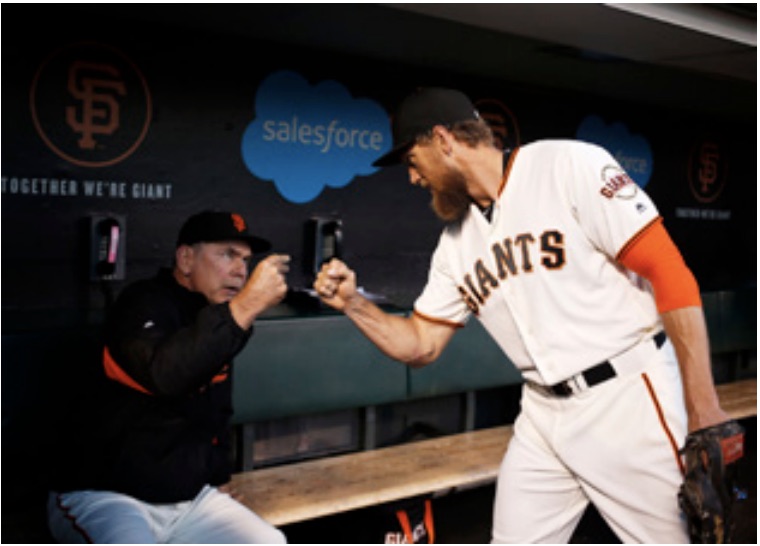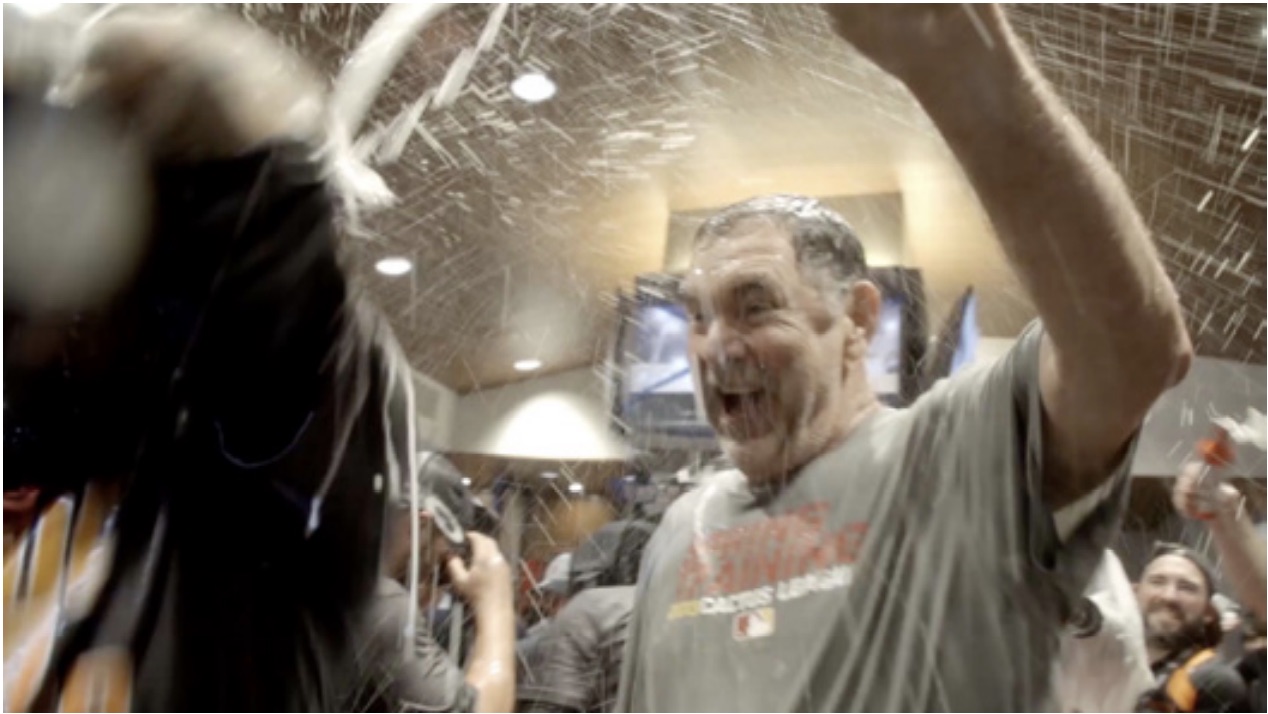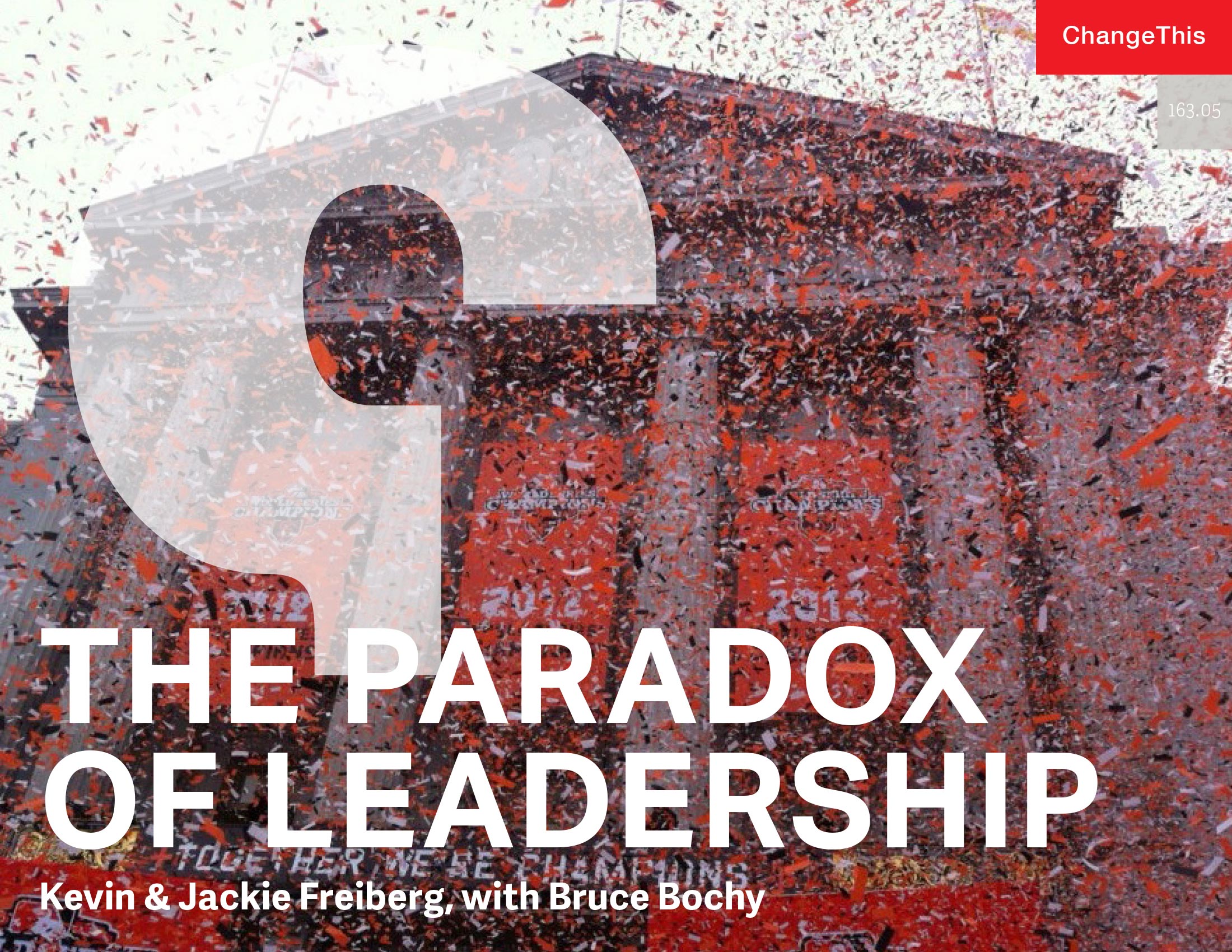The Paradox of Leadership
Bruce Bochy doesn’t like to do anything half-assed.
Boch, as his friends call him, is the manager of the three-time World Champion San Francisco Giants. But he didn’t want to just win on the field, he wanted to be a great ambassador for the club and build a great relationship with the media and the community. So, with a desire to become more well-rounded he connected with us.
We were just finishing our first book NUTS! about how Herb Kelleher and his band of misfits turned Southwest Airlines into the greatest success story in the history of commercial aviation. Since then, we have been writing and speaking about irreverent leaders in unconventional companies who are blowing the doors off business-as-usual.
Boch is as gifted as any CEO we’ve ever met.
We have worked with Bruce since 1995, mostly behind the scenes as a sounding board to give him a different, “outside baseball” perspective.
Our dialogue has always focused on drawing the best out of his players, building team chemistry, finding ways out of a funk, and taking the high road when handling tough questions from the media
He “Gets” Leadership
Somewhere in our first couple of years of working with Boch it dawned on us: We’ve worked with many iconic leaders in our career. Herb Kelleher and Colleen Barrett at Southwest Airlines; Dawn Sweeny at the National Restaurant Association; Ratan Tata at India’s esteemed Tata Group; Nandan Nilekani, cofounder of Infosys; Rob Katz at Vail Resorts; and General Bill Cooney at USAA, just to name a few.
Boch is as gifted as any CEO we’ve ever met. Intelligence, strategy, creativity, courage, heart, and leadership presence—he’s got the whole package. This guy gets leadership.
In a game that has enough data, statistics, and sabermetrics to tax a supercomputer, you can’t adequately measure these character strengths, and you would certainly be hard-pressed to put a price tag on them. Like all great leaders, Boch is a blend of many attributes and actions that are paradoxical. His success is anchored in how he manages these paradoxes.

Here are a few things we’ve learned from perhaps the greatest manager of his era:
Be for your players, but not one of them. Boch easily puts himself in the shoes of his players and thinks like them because he was one of them. This empathy informs his decisions. Today, he is an integral member of the team, but he is not a player and doesn’t try to be. Approachable and affable, he is relevant to his players, yet he respects their space. He is their greatest advocate and often their toughest critic. He is the general, the commander in chief, but he does not see himself as being above anyone. Players respect him and love playing for him because he strikes a balance. Too much separation and he would be out of touch. Too much of trying to be “one of the guys” and he would compromise his credibility.
Be tough, but not mean. You can’t create a World Series–winning franchise without big expectations, tough discipline, and focused execution. Players will test boundaries. They will evaluate how strong a manager is before they wholeheartedly devote themselves to the vision he sets for the team. They want to know: Does he have the courage to make tough decisions that are best for the team? Can he stand up to players who are not living the culture? Is he stalwart in looking out for the good of the group? The problem arises when a leader confuses being tough with being mean. Boch is not domineering, controlling, or brash. He doesn’t force himself on his coaches or his players. He doesn’t lean on the power of title or pedigree; yet, he’s very much in charge.
Be in control, but let go. In his first few years of managing, Boch tried to do everything. He quickly learned, however, that he could be in control without controlling everything. Delegating did several things. It gave him more freedom. It connected his coaching staff and made them feel more engaged. And, it put people who were really good at those things in charge of those things. It is paradoxical; he has gained more control by relinquishing it.
Be constrained, but not limited. When you are part of a small-market club like the Padres (where he managed prior to the Giants), you learn to do more with less or you lose big time. We have never heard Boch complain about payroll constraints. It seems he always considered it a challenge to see what he could do with what he had. When competing against clubs with deep pockets, he seemed to quietly draw from the well of defiance and show the baseball world what his teams could do. Often, his players exceeded the experts’ expectations. Whether it was playing through pain, pushing through self-imposed psychological constraints, or bouncing back when all the prognosticators said it was over, Boch saw constraints as an opportunity to be more creative and draw more from less.
Be a servant, but not a pushover. The only reason to be in leadership is because you have a desire to serve—to right a wrong, to enrich a condition, to draw the best out of others, to make the world better. Boch intuitively understands this. He would do anything for one of his players or coaches; he has their backs. When his teams play poorly, he doesn’t shift blame; he assumes responsibility. When they play well, he doesn’t absorb the accolades; he deflects them and gives his players the credit. Players see Boch as an other-centered person who has managerial courage. He’s direct and firm, yet compassionate when it comes to telling players the difficult truth. He doesn’t shy away from the brutal facts of reality in the media, with his bosses, or with franchise owners either. Boch owns the losses, shares the wins, and handles the rest with dignity and honor.

Know that the more you learn, the less you know. Boch is a lifelong learner who doesn’t believe he has arrived. He knows he can learn something from anyone. He also has enough confidence to own his shortcomings, to be vulnerable and grow. From his first years as a manager it was clear that he wanted to be a great ambassador for the game. That meant being well-rounded and becoming proficient in those parts of the manager’s role that were outside of coaching. Since 1995, he has created an impressive body of work and racked up a boatload of experience. But the game has changed dramatically and with those changes come more questions about managing effectively in this new era. Boch is addicted to the hunt, finding new and better ways of doing it is what keeps him in the game.
Speak without responding, act without reacting. When you manage 25 different, often eccentric personalities, there is plenty of room for drama. Yet, Boch has had very little of that in his clubhouses. One reason for this is the calming effect he has on his players. He doesn’t overreact. If a player is “amped” about something, he doesn’t mirror that behavior. Instead, he will just listen and let the player get it out, whatever “it” is. Boch intuitively knows that reacting to a situation could exacerbate it.
The better part of prudence is often to do nothing and let time play a role. We’ve watched him do this with players who said something derogatory or questionable in the media because they were upset about something that happened during a rough game. We knew Boch was ticked. We know how most people would have reacted. But he took a different tack. He took a step back, made sure he had all the facts, reflected on what the player might be thinking. He patiently gave it a day or two before reacting and then he rationally moved to resolve the conflict.
Boch is an action-oriented leader. He’s not prone to denial or putting things off because of fear. But there is wisdom in his restraint. Boch has often cut cycle time and accelerated conflict resolution by not forcing a situation prematurely. This is one among many reasons his teams have had such outstanding team chemistry.
Be confident yet humble. The fusion of these two seemingly paradoxical or contradictory virtues makes the Giants clubhouse both empowering and unique.
Players are attracted to confidence. Not the kind of pop culture bravado that is overly brash and arrogant; that shows up in someone who speaks their mind with little consideration of others and tells a good story, usually about themselves. That kind of show might be intriguing. The stories might be entertaining—for a while. But eventually they wear thin and people see through the veneer to a poser who is trying to compensate for some insecurity.
Players are drawn to a truly authentic kind of confidence, often demonstrated in a quiet, calm resolve that is understated yet powerfully present and fearless. It is grounded in being overly prepared, extremely competent, and willing to risk big things on behalf of others. It can stand up to a lot of tension and flack; it can also sit back and make room for others to contribute. Humility makes us more accepting of ourselves and less judgmental of others.
Players are also drawn to humility—to leaders who have a realistic awareness of their own limitations, insufficiencies, and needs of others. Humility makes them more accepting of themselves and less judgmental of others. In the world of baseball, great managers are compassionately demanding. That is, they continually raise the bar and ask a lot of their players, but with empathy and a deep-seated appreciation for how hard the game is.

Confident Humility in Action
Boch is that kind of person. He’s a rock. Players rally around him because they trust his judgment and sense of fairness—even if his decisions don’t bend in their favor. He argues with umpires for his guys on the field, stands up for them in the media, and yet, he calls them out in the clubhouse when he thinks they can be more than they have become.
It goes the other way as well. Boch owns it when he makes a mistake. After a recent grueling home game, the conversation with Kevin went like this:
K: How are you doing?
B: Outside of just managing the worst game of my entire career, I’m doin’ okay.
K: Really, what went wrong?
B: I went against my gut and left [a pitcher] in too long, he gave up a run, and it cost us the game. I think Kim is standing by the window to make sure I don’t jump out.

Kim Bochy is as petite as they come. Stopping Boch from taking that plunge would be like standing a field mouse in front of a Mack truck to block it. But that’s classic deadpanning from Boch. He can find humor even in the direst circumstances.
The next day he gathered the players, told them they deserved better, and apologized. “You guys played great. That game was on me, fellas.” No excuses. No self-justification. Just an unconditional respect for his guys that caused him to acknowledge his blind spots and come clean. Part of treating players like people is owning your mistakes and making amends. It sends a powerful signal about unity and how much you care. Humility owns mistakes and practices the art of the apology. Great leaders get good at the art of the apology.
Unwarranted confidence or confidence expressed at the wrong time, in the wrong place, to the wrong audience can cross the line into arrogance. On the other hand, too much humility can border on self-deprecation, on belittling or undervaluing what you or your team is capable of achieving. Self-importance and self-deprecation are simply different sides of the same coin: self-indulgence. And, self-indulgence disrupts team unity.

If chemistry is important, there must be a unique blend of confidence and humility. Here’s how Boch explains that balance.
Boch: Confident humility means you have to:
Be confident enough to have a little swagger. But humble enough to know that you didn’t get here by yourself.
Be confident enough to know that you did it and can do it again. But humble enough to never think you’ve arrived.
Be confident enough to face an opponent from a position of strength. But humble enough to realize that you can never learn enough about him.
Be confident enough to stay focused when it is time to get down to business. But humble enough to take time for the media or be gracious to a kid who wants an autograph.
Be confident enough to call someone out who isn’t getting it done. But humble enough to know that you will eventually be on the other side of that conversation someday.
Be confident enough to know that you have earned the right to be here. But humble enough to realize that you never arrive; you have to earn it constantly––each win only buys you an admission ticket to play another day.
One Size Fits One
Leadership is rarely a black and white, one size fits all, kind of endeavor. One reason emotional intelligence has gained so much traction over the last ten years is because leadership is complex—there is a paradox to be navigated—and emotionally intelligent leaders understand that one size doesn’t fit all.
Take a moment to ask yourself, “Can I maneuver between two opposite ways of leading when both are effective? Am I agile? How well do I navigate the paradox?”
Think both/and versus either/or.
Increasing your mental flexibility to find a wider range of options when managing conflict, solving problems, and inspiring others requires a high level of unselfishness and a willingness to give the situation what it needs—not just what you are comfortable with.





